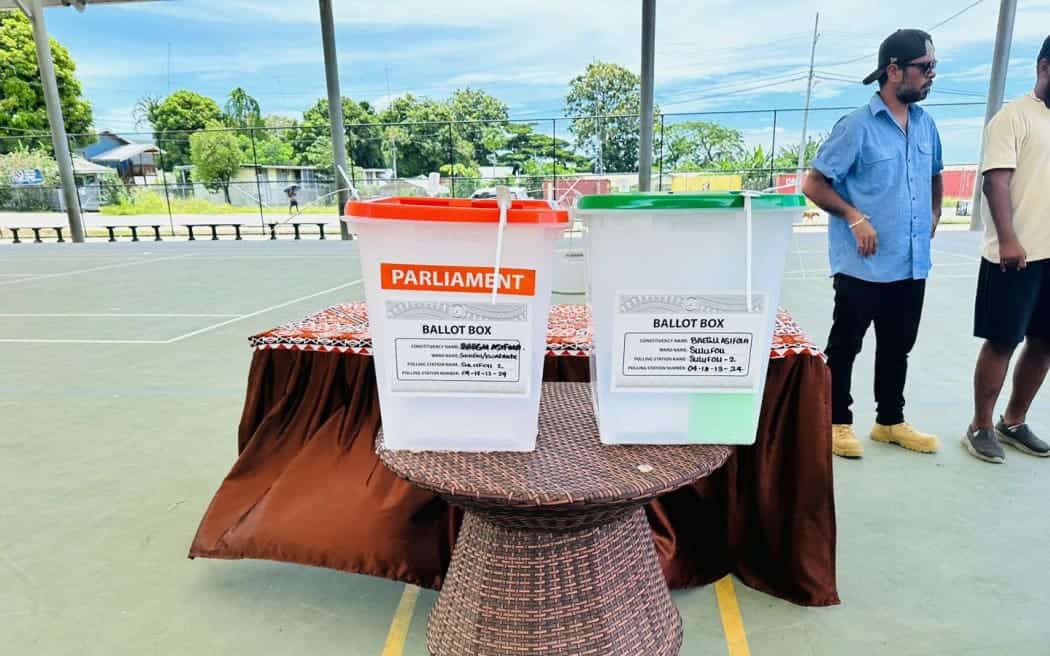An intense period of political horse-trading is underway in Solomon Islands after no political party won enough seats in last week’s election to form government on its own.
In what one expert labelled an “extraordinary process” where “acts of corruption” historically take place, the main political parties and their winning MPs will now divide into camps in hotels across the capital Honiara to try and build a governing coalition and select a prime minister.
The process is expected to take weeks.
The incumbent, pro-China prime minister Manasseh Sogavare, leads a crowded pack, even though his party lost more than half its seats, finishing the count with 15 MPs.
In Solomon Islands, 26 MPs are needed to form a government.
In an interview with local media site Tavuli News after the count — and his re-election — was confirmed, Sogavare said the “first big battle is over”.
“The next step is the formation of government,” he said.
“We still have a very weak party system in the Solomon Islands which we need to improve so that we can have the certainty so that when people are elected you can tell which party will be taking government.
“It’s hard to do that at this time.”
Sogavare is attempting to make history by becoming the first sitting Solomon Islands prime minister to serve a full-term and be re-elected prime minister. It would be his fifth stint in the top job.
In this latest stint, Sogavare attracted international attention by drawing Solomon Islands closer to Beijing since switching diplomatic recognition from Taiwan. His decision to sign a security pact with China in 2022, as well as opening the door to Chinese police to conduct training in the country, sent shock waves through Canberra.
His latest term has also been defined by his controversial embrace of China’s governing style and his combative stoushes with western democracies, such as Australia and the United States.
And in a further escalation of that tension, Sogavare used this week’s interview with local media to make unsubstantiated claims about what he said was influence by the United States in the election in his home province.
In the interview, he claimed the U.S “promised” to pay for the school fees of those who voted for his rival.
“It’s geopolitics at work here,” he said.
“I’m going to write a letter to the United States of America, the U.S Embassy.
“Our people, the people who voted for me, we won, they’re saying let them [the United States] pay for these other voters … you look after U.S.”
The U.S Embassy in Honiara has been contacted for comment.
Solomon Islands’ Sogavare says he runs security amid tense wait for new government
Solomon Islands Prime Minister Manesseh Sogavare said he narrowly won his seat and still exercises power over security in the Pacific Islands nation, as he vies with opposition parties to form government after an election delivered no clear winner.
Election results on Wednesday showed Sogavare’s OUR party won 15 out of 50 seats in the national parliament, with major opposition parties holding 20 seats, and independent and micro parties controlling 15 seats.
Last week’s election was the first since Sogavare struck a security pact with China in 2022, inviting Chinese police into the archipelago and drawing the Pacific Islands nation closer to Beijing.
The election is being watched by China, the U.S and neighbouring Australia because of the potential impact on regional security.
United party leader Peter Kenilorea Jr and Democratic Alliance Party leader Rick Hou told Reuters the situation was fluid as lobbying of independents got underway, in a race to find the 26 seats needed to form a government.
In an interview with Tavuli News published on Wednesday, Sogavare said he had won his seat of East Choiseul by “the narrowest of margins”, which was “much to the disappointment of the western world”.
Sogavare said the world was interested in the outcome of the election because of his government’s decision in 2019 to switch diplomatic ties from Taiwan to China.
During the post-election period of lobbying to form government, he remains in control, he said.
“I exercise full executive power when it comes to security, when it comes to safety of this country, I continue to run the country,” he said in the interview, adding he was concerned about possible riots.
Anti-government riots in 2021 saw buildings burnt in the capital Honiara, prompting Sogavare to request help from Australian police, and were also cited as the reason for a policing deal with China six months later.
Police and election officials have said the election process has been mostly calm, and on Monday evening, the Royal Solomon Islands Police Force Commissioner Mostyn Mangau said in a statement the police force is “a neutral law enforcement organisation which is not politically affiliated”.
Police and defence forces from Australia, New Zealand, Papua New Guinea and Fiji are assisting with election security, at the invitation of Sogavare’s government.
Sogavare said his OUR party had the support of two micro parties, and would woo independents, claiming the opposition parties were divided over who they would back as prime minister.
“There’s huge competition on the other side, something will break,” he said.
The CARE coalition of Matthew Wale’s Solomon Islands Democratic Party, U4C and former prime minister Rick Hou’s Democratic Alliance Party is on 13 seats.
Kenilorea Jr’s United, which said it would scrap the China security pact, won seven seats and could join CARE.
“We have not joined CARE at this time,” Kenilorea said on Tuesday. “We are seeking change and will align with like-minded groups that also share this,” he said.
